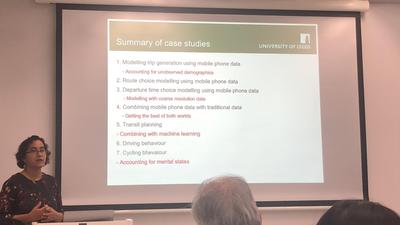[終了]第37回TSUセミナーの内容
[2019年8月22日]
本日は学内にて,Charisma F. Choudhury先生による交通ビッグデータに関するTSUセミナーが開催されました.
Charisma先生はイギリスのリーズ大学(UoL)の准教授で,Choice Modelling Research Groupを率い,主に選択モデルの研究を行っておられます.先生の論文の一部として開発された自動車運転に関する行動モデルは,AIMSUNやVISSIMなどの主要な商用交通シミュレーションツールに実装されています.
本日の講義ではケーススタディとして,携帯電話の位置情報データ,通話記録データなどのような匿名のビッグデータを活用して,潜在人口統計モデルなどの枠組み提案や,従来から存在するデータ(アンケートベースの調査など)との比較,機械学習との組み合わせによる交通分析などをご教授頂きました.
続いて,以下に当日行われたプログラムの内容説明について再掲いたします.
ーーーーーーーーーーーーーーーーーーーーーーーーーーーーーー
“The 37th TokyoTech TSU Seminar“
We will hold TSU(Transport Studies Unit) public seminar.
( Overviewed announcement → http://www.transport-titech.jp/seminar_visitor.html )
( Detailed announcement → http://www.transport-titech.jp/seminar_visitor/2019/TSU-SV2019-037.pdf)
Presentation Title: Travel behaviour modelling using emerging big data sources
Date: August 22th (Thu.) 2019
Time: 15:00 -16:30
Venue: Tokyo Tech. Ookayama Campus, Multi-Purpose Room, 1st Floor, Midorigaoka Buidling #6
(https://www.titech.ac.jp/english/maps/ookayama/midorigaoka.html)
Speaker: Charisma F. Choudhury, PhD, FHEA
Deputy Director, Choice Modelling Centre Associate Professor,
Institute for Transport Studies & School of Civil Engineering
University of Leeds, Leeds, UK
Presentation Abstract:
Over the last decade, passively generated big data sources have emerged as a very promising source of activity and mobility information. Examples include GPS, mobile phone, smartcard and social media data, online browsing and purchase records of tickets, cars/bikes, residential properties, etc. However, due to the coarse spatial and temporal resolution, sampling and privacy issues, these data sources are yet to be used for mainstream travel behaviour modelling. The presentation will include four case studies on how these big data sources can be used for mainstream transport modelling – each focusing on a unique limitation of the big data. Case study 1 proposes a ‘latent demographic model’ framework to utilize large scale anonymous data from mobile phones and applies it in the context of trip generation modelling in Switzerland. Case study 2 proposes an application of the ‘broad choice modelling’ framework to deal with the coarse spatio-temporal resolution of the mobile phone data in the context of route choice modelling using call detail record data from Senegal. Case study 3 contrasts the performances of mobile phone and GPS data in the context of departure time choice modelling in Switzerland. Case study 4 proposes a methodology to fuse the household survey and mobile phone data to get the best out of both worlds. The presentation will conclude by summarizing the insights gained from these studies and an overview of some other ongoing research.
Bio:
Charisma Choudhury is an Associate Professor at the Institute for Transport Studies and School of Civil Engineering at the University of Leeds (UoL)where she leads the Choice Modelling Research Group. She also serves as the Deputy-Director of the interdisciplinary Choice Modelling Centre, UoL. Prior to joining UoL, she has worked as an Assistant Professor at Bangladesh University of Engineering and Technology (BUET), as a Postdoctoral Research Associate at Massachusetts Institute of Technology (MIT) and as Analysts in RAND Europe, UK and Cambridge Systematics, USA. Charisma holds PhD and MSc from MIT. For her doctoral work, she had focused on developing driving behaviour models with ‘Dynamic Latent Plans’. The driving behaviour models developed as part of her thesis have been implemented in leading commercial traffic simulation tools including AIMSUN and VISSIM. In recognition of her doctoral research, she has received the Gordon Newell Best Dissertation Prize from the HKSTS and an Honourable Mention from the IATBR. Her research interests include travel behaviour modelling using emerging data sources and transport issues in the Global South.




